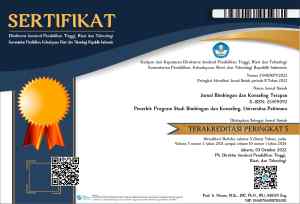Cognitive Behavior Therapy Teknik Thought Stopping untuk Mengurangi Insecure
Abstract
In recent years, many insecure phenomena have appeared in several individuals, without exception for students, so students prefer to think negatively about themselves and cause themselves to lose confidence because there is something that makes them threatened and insecure. Therefore, there is a need for handling students who have a high level of insecurity, so that students can be more confident in developing their potential.This study was aimed at looking at the effectiveness of Cognitive Behavior Therapy group counseling with the Thought Stopping Technique to reduce the level of insecurity. The method used in this research is pre experiment with One Group Pre test Post Test Design. In this study the sample was chosen not randomly (purposive sampling) from 12 students in class XI.OTKP SMK Muhammadiyah Magelang City taken a sample of 9 students as members experimental group. This research was conducted in 6 meetings. MThe method used as data analysis is using parametric statistics Sample T-Test with SPSS 26 Software. The results of the study indicate that the Cognitive Behavior Therapy group counseling Thought Stopping technique has an effect on reducing the level of insecurity. This can be proven based on the results of the Paired Sample T-Test analysis with a significant probability value of 0.001 <0.05.
Keywords
Full Text:
PDFReferences
Aini, D. K. (2019). Penerapan Cognitive Behavior Therapy dalam Mengembangkan Kepribadian Remaja di Panti Asuhan. Jurnal Ilmu Dakwah, 39(1), 70-90.
Aristiani, R. (2016). Meningkatan percaya diri siswa melalui layanan informasi berbantuan audiovisual. Jurnal Konseling Gusjigang, 2(2).
Badriyah, S. (2020). Efektifitas Konseling Kelompok dengan Teknik Thought Stopping untuk Mereduksi Kecemasan Sosial Siswa. Jurnal Fokus Konseling, 6(1), 19-25.
Beck, A. T., Davis, D. D., & Freeman, A. (Eds.). (2015). Cognitive therapy of personality disorders. Guilford Publications.
Chafsoh, A. M. (2020). Munculnya Culture Shock Pada Mahasiswa Baru Dalam Perkuliahan Daring Selama Pandemi Covid-19.
Daniel, P. (2021). Penggunaan Aplikasi Tiktok untuk Mempublikasikan Karya Mencintai Ketidaksempurnaan Diri melalui Kampanye Love Imperfection.
Fitri, D. (2017). Efektifitas Cognitive Behavior Therapy untuk Menurunkan Kecemasan Berbicara di Depan Umum pada Mahasiswa. Jurnal Psikologi, 10(1)
Gainau, M. B. (2020). Pengembangan Potensi Diri Anak dan Remaja. Yogyakarta: PT Kanisius.
Lianasari, D., Purwati, P. (2021). Konseling Kelompok Cognitive Behavior Teknik Thought stopping untuk Mengurangi Anxiety Academic Terhadap Skripsi. Counsellia:Jurnal Bimbingan dan Konseling, 11(2), 117-126.
Mardiana, N., Yosep, I., & Widianti, E. (2021). Fenomena Insecure Pada Remaja Di EraPandemic Covid-19: Studi Literature. Jurnal Ilmu Kesehatan UMC . 10(2), 21-29.
Mirhan, & Jusuf, J. B. K. (2016). Hubungan Antara Percaya Diri dan Kerja Keras Dalam Olahraga dan Keterampilan Hidup. Jurnal Olahraga Prestasi. 12(1), 89-96.
Oentarto, A. (2021). Cara Mengubah Insecure dengan Teori Cognitive Behavior Therapy (CBT) dan menggunakan teknik Cognitive Behavior Modification.
Rasimin, M. P., & Hamdi, M. (2018). Bimbingan dan Konseling Kelompok. Jakarta: Bumi Aksara.
Saliawati, D. (2012). Percaya diri, Keingintahuan, dan Berjiwa Wirausaha: Tiga Karakter Penting Bagi Peserta Didik. Jurnal Pendidikan Karakter, 3(2).
Sari, D. W., & Abdullah, S.M. (2021). Thought Stopping untuk Menurunkan Kecemasan Mahasiswa yang Sedang Menyusun Skripsi. JIP (Jurnal Intervensi Psikologi), 13(2).
Sugiyono . 2019. Metode Penelitian Kuantitatif, Kualitatif, dan R&D. Bandung: Alfabeta.
Yumnah, S., Islam, A., & BAngil, P.(2016). Kecerdasan Anak Dalam Pengenalan Potensi Diri. Jurnal Studi Islam, 11(2), 22-34.
DOI: http://dx.doi.org/10.30598/jbkt.v7i1.1655
Refbacks
- There are currently no refbacks.

This work is licensed under a Creative Commons Attribution 4.0 International License.
Published by:
Pattimura University
Address: Department of Guidance and Counseling, Faculty of Teacher Training and Education Science (FKIP).
Jl. dr. Tamaela, Ambon - Mollucas -Indonesia
Ph. +628114378333
Home page: http://ojs.unpatti.ac.id/index.php/bkt/index
e-mail: paul.arjanto@lecturer.unpatti.ac.id
Jurnal Bimbingan dan Konseling Terapan is licensed under a Creative Commons Attribution 4.0 International License.




















